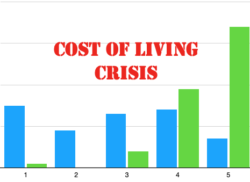 Abraham Lincoln
If given the truth, the people can be depended upon to meet any national crisis...
Abraham Lincoln
If given the truth, the people can be depended upon to meet any national crisis...
 Guildford news...
for Guildford people, brought to you by Guildford reporters - Guildford's own news service
Guildford news...
for Guildford people, brought to you by Guildford reporters - Guildford's own news service
Letter: Capping Prices Is the Wrong Approach to the Energy Price Hikes
Published on: 20 Aug, 2022
Updated on: 20 Aug, 2022
Green Party spokesperson
In response to: Further Capping of Electricity Prices Would Be Eminently Sensible
Capping electricity prices is the wrong approach, and I say that as a member of a political party which has just announced that it would return the cap to the pre-Oct 2021 level.
It is typical of opposition parties to find a policy with a good sound-bite and use it to attack the government’s strategy (or lack of a strategy in this case). First Lib Dems, then Labour, then Greens have fallen for this trap with the energy cap. The Green’s announcement is perhaps the most surprising since lowering the cap goes against their own philosophy.
Energy bills are going up because of the increasing cost of oil and gas. Fossil fuels costing a lot is not a bad thing on its own. In fact, Green’s proposed carbon tax is intended to increase the cost of fossil fuels and create market conditions exactly as we have now, ie expensive fossil fuels, but cheap renewables.
This effectively acts as a driver to move people away from carbon-intense gas and oil to low-carbon renewables and nuclear.
By “cancelling the cap increase” or even “lowering the cap” that households pay and having the government fork out £billions to fossil fuel companies to pay the difference is one of the most ridiculous ideas during a climate crisis. It effectively neutralises the market difference between carbon-efficient and carbon-intense fuels by ensuring energy suppliers’ profits are protected and consumers’ bills remain the same.
Right now, demand for solar panels has never been higher. That’s the market at work. Now is not the time to interfere.
Of course, at this point, people are probably screaming “what about the people who can’t afford the rising costs?!”. Of course, something has to be done to protect consumers, but why does it have to be subsidising their energy bills by cancelling the cap increase? Far better to boost incomes to offset the rising costs.
The Labour/Lib Dem/Greens plan, it is estimated, will cost between £29 billion (Labour’s hugely underestimated figure) to £42 billion (Lib Dem’s more reasonable estimate). This would save a typical household £1,000 per year.
For the same cost, we could leave the energy firms in private ownership, give every household £1000, and every household on universal credit £2000. This would produce the same level of savings for households but, importantly, not subsidise the cost of fossil fuels and therefore maintain current market conditions that is driving a change in consumer (and investor) behaviour resulting in an accelerated shift away from fossil fuels.
Or let us look at it a different way: the government can either give £1,000 per household to the big oil and gas giants or it can give it to households. To the individual, the effect is the same. To the market, and the rate of acceleration away from carbon-intense fuels, the effect is markedly different.
Recent Articles
- Guildford Institute’s Crowdfunding Project for Accessible Toilet in its New Community and Wellbeing Centre
- Letter: Guildford – Another Opportunity Missed?
- Letter: GBC’s Corporate Strategy – Where Is the Ambition?
- My Memories of John Mayall at a Ground-breaking Gig in Guildford Nearly Six Decades Ago
- Westborough HMO Plans ‘Losing the Heart of the Street’ Says Resident
- College Invests to Boost Surrey’s Economy and Close Digital Skills Gap
- Community Lottery Brings Big Wins for Local Charities
- GBC Housing Plan Promises ‘A Vibrant Urban Neighbourhood’ Near Town Centre
- Hospital Pillows ‘Shortage’ at the Royal Surrey
- Updated: Caravans Set Up Camp at Ash Manor School


Search in Site
Media Gallery
Dragon Interview: Local Artist Leaves Her Mark At One of England’s Most Historic Buildings
January 21, 2023 / No Comment / Read MoreDragon Interview: Lib Dem Planning Chair: ‘Current Policy Doesn’t Work for Local People’
January 19, 2023 / No Comment / Read MoreA3 Tunnel in Guildford ‘Necessary’ for New Homes, Says Guildford’s MP
January 10, 2023 / No Comment / Read More‘Madness’ for London Road Scheme to Go Ahead Against ‘Huge Opposition’, Says SCC Leader
January 6, 2023 / No Comment / Read MoreCouncillor’s Son Starts Campaign for More Consultation on North Street Plan
December 30, 2022 / No Comment / Read MoreCounty Council Climbs Down Over London Road Works – Further ‘Engagement’ Period Announced
December 14, 2022 / No Comment / Read MoreDragon Interview: GBC Reaction to the Government’s Expected Decision to Relax Housing Targets
December 7, 2022 / No Comment / Read MoreHow Can Our Town Centre Businesses Recover? Watch the Shop Front Debate
May 18, 2020 / No Comment / Read More










Recent Comments